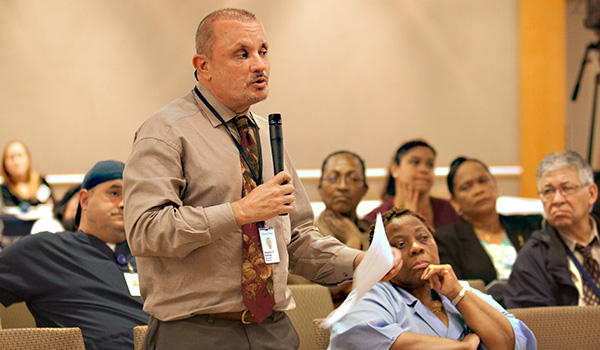1199SEIU, Montefiore Medical Center Host Diabetes Forum
June 6, 2013
Members and staff at Montefiore Medical Center in the Bronx, NY participated on May 28 in a day of wellness and education with career and wellness fairs and a diabetes forum held at the institution. The events were collaborations of 1199SEIU, Montefiore and the Bronx Healthcare Collaborative Learning Project.
The diabetes forum had particular gravitas because the Bronx ranks first in New York City’s diabetes crisis, with more than 12 percent of its residents diagnosed with the disease. In the Bronx, rates of Diabetes are almost double those of Manhattan, with African-Americans and Latinos disproportionately affected by the disease and inequities in the healthcare system.
The forum’s panel included nurse educators, a physical therapist, a dietitian and a patient advocate. Each of them discussed their areas of specialty and the importance of patient education in treating diabetes. Topics included the importance of physical activity, proper nutrition, cultural sensitivity in treating diabetes patients and the dangers of pre-natal diabetes. Speakers emphasized the importance of early diagnosis, proper medical care and--perhaps most importantly--prevention if possible, through healthful eating and lifestyle habits.
The event’s keynote speaker was Dr. Joel Zonszein, Director of Montefiore’s Clinical Diabetes Center East Campus. In his presentation, Dr. Zonszein discussed the tremendous racial disparities in diabetes treatment and the costs to the healthcare system in treating acute diabetes symptoms such as heart disease, blindness and neuropathy.
“It’s an expensive disease,” said Dr. Zonszein. “$245 billion in 2012 has increased dramatically from $58 billion in 2007 for inpatient care.” He characterized the disease a “socio-economic tsunami” for the borough.
1199 Delegate Maurice Depalo, a Montefiore pharmacist, said the forum’s emphasis on education was invaluable. “A lot of these numbers would come down if we concentrate on educating our children,” said Depalo. “Children have a great effect on adults. When we educate our kids we might not know how much impact they have right away, but they really would.”
For more information, log onto the American Diabetes Association’s website at www.Diabetes.org.


